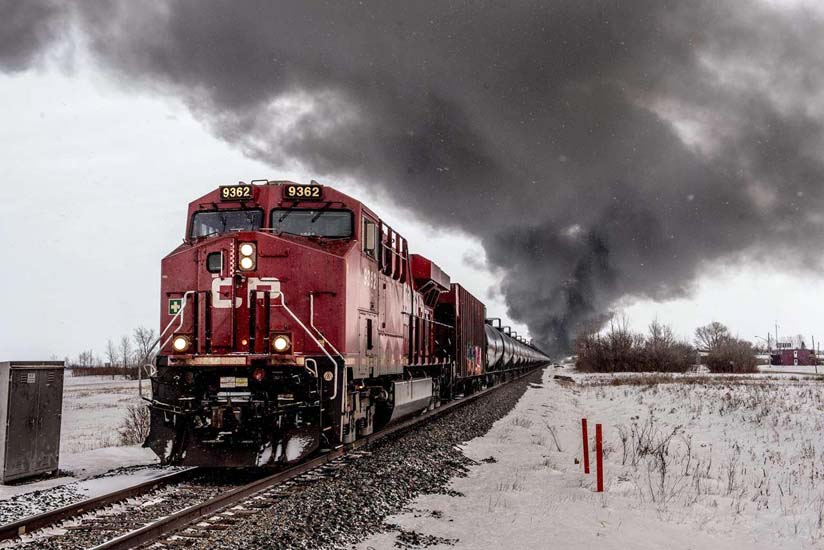

Guernsey Saskatchewan - The second oil tanker derailment near Guernsey on 6 Feb 2020 has led to preliminary findings by the Transport
Safety Board (TSB) detailed in a letter which outlined the extent of the derailment.
Twenty-seven of the cars were involved in the breach and fire that saw an estimated 1.6 million litres of crude oil lost to leaking or
combustion.
The letter indicated that impact marks found the wheels of cars in the 28th, 29th, and 31st positions were consistent with a strike from a broken
rail.
In spite of the fact that the breached containers were the new puncture resistant 117J100-W cars, the derailment resulted in the spillage and subsequent fire
which sent 85 residents of the village of Guernsey into evacuation.
The letter notes that the continued increase in size of trains carrying dangerous goods has placed equivalent stresses on the Class 4 tracks like the CP
Sutherland Subdivision which runs adjacent to Guernsey.
"For example, in 2017, CP transported 10,523 tank car loads of petroleum crude oil on its Sutherland Subdivision.
This had increased to 77,312 tank car loads in 2019," outlines the letter.
The letter cites similar issues having occurred along a heavily trafficked Class 4 line operated by CN in northern Ontario, which saw two similar derailments
in 2015.
A subsequent investigation noted the derailments had been caused by track failure and that CN had not provided adequate maintenance to support the increased
volume along the line.
Subsequent improvement to the infrastructure of that section, The Ruel Subdivision between Timmins and Sudbury, have meant there have been no further
derailments.
The letter draws an immediate parallel to the two derailments near Guernsey.
"While both investigations are ongoing, in both cases, the suspected cause appears to be related to a broken rail. Considering the 2015 CN derailments on
the Ruel Subdivision, and the recent CP experience on the Sutherland Subdivision, maintaining track to the TSR minimum standards on key routes may not be
adequate to protect against derailments."
The letter, signed by Dan Holbrook, Acting Director of Investigations, notes that the Track Safety Rules that govern both track maintenance and infrastructure
have not kept pace with increased loads and frequency of heavy transport.
It concludes with a recommendation that track infrastructure needs to be adequately maintained and that Transport Canada considers revising the Rules
Respecting Track Safety "to include enhanced track standards for key routes."
CP crews remain on site working on the rail and bed at the site of the February derailment.
Maury Wrubleski.
provisions in Section 29 of the Canadian
Copyright Modernization Act.
